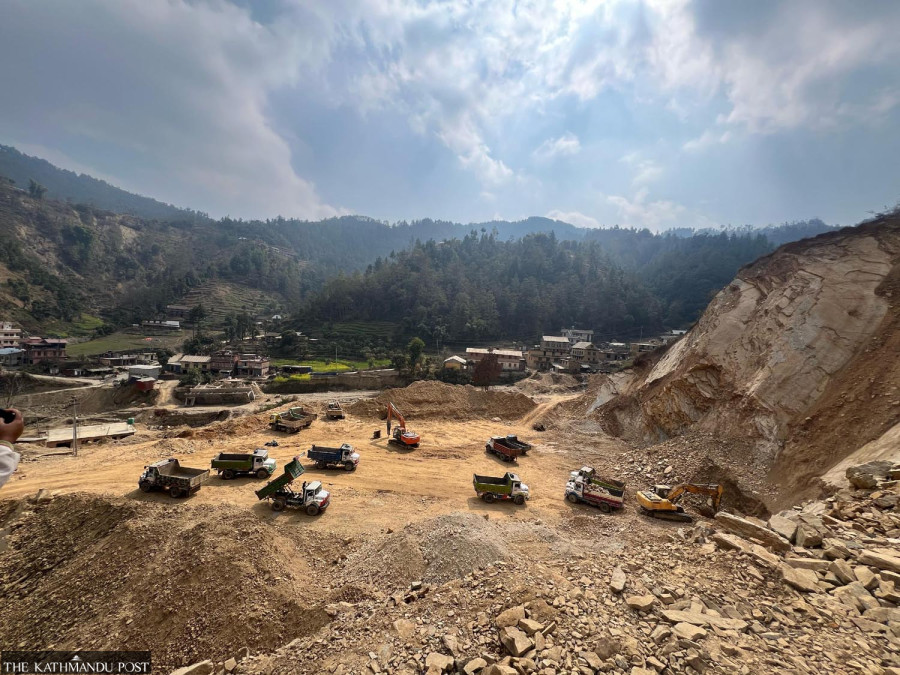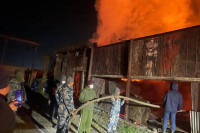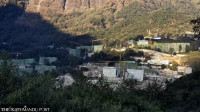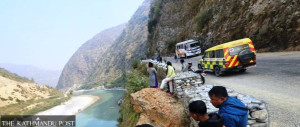Bagmati Province
Noise, dust and fear. Bethanchok battles crusher plants
Unregulated stone quarries in Bethanchok and Panauti in Kavrepalanchok have put schools, homes, and lives at risk. Residents call for urgent action.
Jyoti Shrestha
A stone quarry is operating near a school building. Classes are going on inside, but neither the students can hear their teachers well nor can teachers understand the students due to the thunderous noise of the crusher machine.
This is the situation at Shree Ganesh Basic School in Chalal Ganesthan in ward 4 of Bethanchok Rural Municipality in Kavrepalanchok. Studies have been disrupted by the excavation work at Chalal Ganeshthan Mineral Industry Pvt Ltd. Students complained that the stone quarry greatly affected their studies and their health.
“When the breaker is operating in the mine, we hear nothing. The dust from the mine blankets the school. It has become very uncomfortable to study,” said Karan Magar, a seventh grader at the school.
Students, teachers and local residents have raised their concerns about the disturbances caused by the stone mine. They have urged the authorities concerned to ban stone quarries near educational institutions.
“We don’t have a proper environment to study due to the mine. Our health is also at risk. How can we study in such conditions?” said Parbati Tamang, another student at Shree Ganesh Basic School.
According to teachers, school children, mainly those in child development level, are psychologically affected due to the nearby mining operations. “When the breaker operates, the ground itself shakes, which frightens the young children. The noise and dust are unbearable. The health of children and teachers are at high risk due to dust from the quarry,” said a teacher at the school, requesting anonymity.
Villagers living near the mine are also worried about the impending risk of landslides due to the haphazard extraction of stones. “Excavation is going on right in front of our house. If it continues like this, the mound can bury our home," said Naxal Maya Tamang, a local.

People of Kavrepalanchok, a hill district in Bagmati Province, are still traumatised by the rain-induced disasters that struck in the last week of September 2024. Kavrepalanchok was the worst-hit district by the floods and landslides that struck various parts of the country. A total of 78 people were killed in the district, and the disasters destroyed various infrastructures, including houses, roads, community buildings, drinking water projects, and utility poles.
Locals blame the haphazard extraction of stones and pebbles by crusher plants as a major cause of the devastating floods and landslides in Kavrepalanchok.
Lila Bahadur Lama, a resident of ward 4 of Bethanchok, is deeply worried about the possibility of another disaster similar to that in September last week. “Even though the crusher plant has legal permission, the risk of disaster is very high in this area. We are forced to live in fear due to the crusher plants and quarries near our settlements,” said Lila Bahadur.
Villagers have complained that mines and crushers are being operated near schools, health posts and residential areas. “The dust from the mines is making people sick. We don't know the legal standards for operating such mines and crushers, but if they are allowed to run near settlements, we will continue to suffer,” said another local from Chalal Ganeshthan.
A meeting of the district monitoring committee, Kavrepalanchok, on January 22 concluded that crusher plants and the fragile topography were the main causes of floods and landslides in September last week. The committee decided to urge authorities to enforce existing legal provisions for regulating crusher plants, but no action has been taken so far.
Currently, three crusher plants are in operation in Bethanchok, the worst-hit local unit in Kavrepalanchok by the floods and landslides. Bhagawan Adhikari, the chairman of Bethanchok Rural Municipality, said that all three plants are legally registered and have been granted permission to extract stones.
Similarly, out of the 11 mines and five crusher plants registered in the highly affected Panauti municipality, seven mines and five crusher plants are currently operational. Gita Banjara, deputy mayor of Panauti Municipality, said the mines and crusher plants operating in the municipality are not illegal.




 21.12°C Kathmandu
21.12°C Kathmandu













